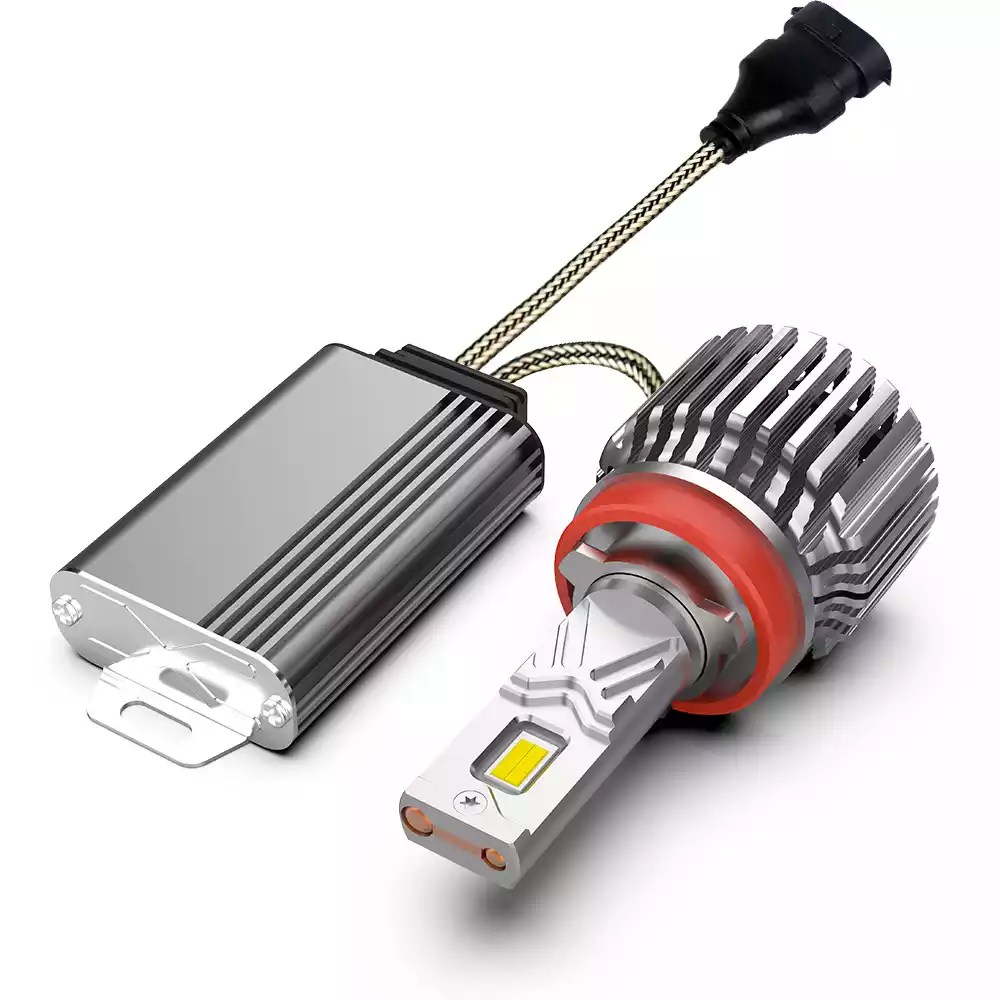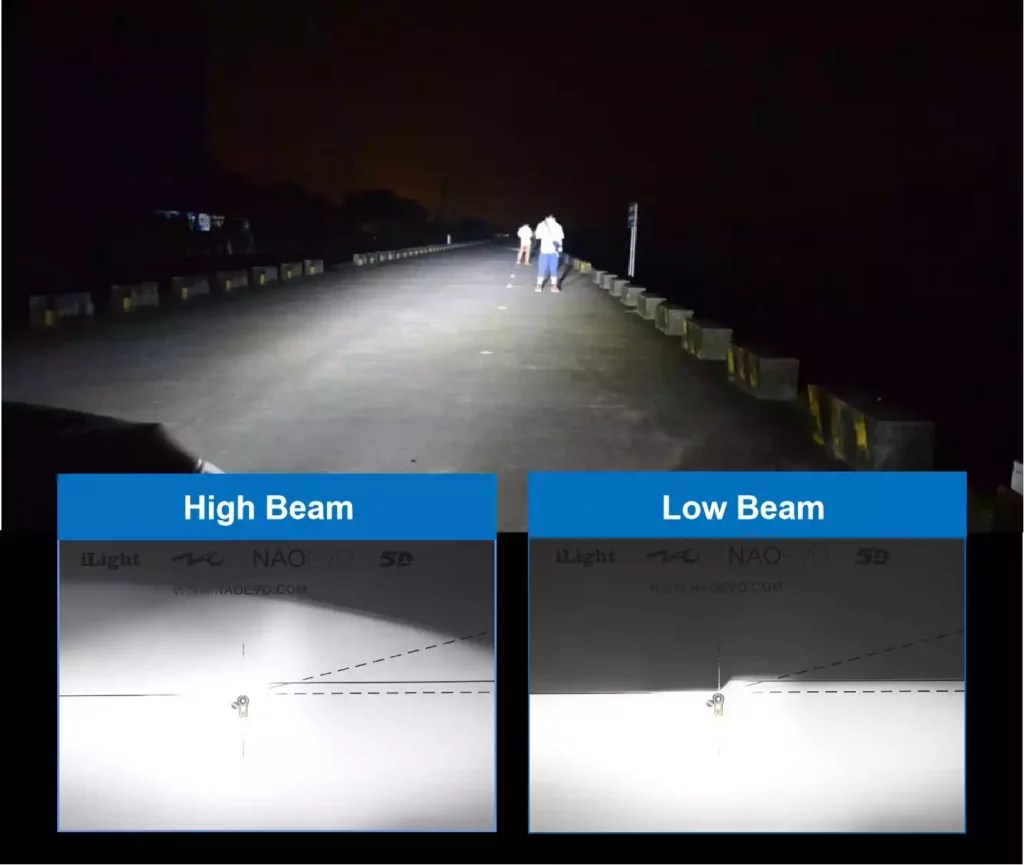LED headlights have become a popular choice for many drivers due to their energy efficiency, durability, and brighter light output. However, the legality of LED headlight bulbsis a topic of concern for many drivers. In this article, we will explore the legal requirements for LED headlight bulbs in different regions and provide sometips on how to choose LED headlight bulbs without causing glare light to others.
Table of Contents
In California, the regulations governing LED headlight bulbs are similar to the federal regulations, but there are some additional requirements that apply specifically to California.
1. Headlight color:As mentioned, car headlights in California must emit a white or yellow light and cannot have a blue tint. The CCR specifically states that “no vehicle may be equipped with a lamp that emits a blue light” (CCR 25600).
In a word, it they are aftermarket upgrades, they should have a white color temperature ranging between 5000K – 6000K and should not be positioned too high or too low from the ground.
2. Headlight brightness and glare:California has regulations regarding the brightness and glare of headlights to ensure that they do not blind other drivers on the road. The CCR specifies that headlights must be aimed and adjusted so that they do not project a glare that interferes with the vision of drivers of oncoming vehicles (CCR 25610). In addition, the CVCrequires that headlights be used in a manner that does not blind other drivers on the road (CVC 24409).
3. Aftermarket LED headlight bulbs:California requires that all aftermarket LED headlight bulbs be marked “DOT” (Department of Transportation) to indicate that they comply with federal regulations. The CCR specifies that any headlight bulb sold or offered for sale in California must meet the requirements of Federal Motor Vehicle Safety Standard (FMVSS) No. 108, which sets standards for headlight brightness and beam pattern (CCR 25620).
The market for vehicle sales in India is experiencing a remarkable rate of growth, making it one of the fastest-growing regions globally.Some popular cars in India are Maruti Suzuki, Hyundai, Honda, Toyota, and Tata etc. Therefore, in India, is it legal to use white LED headlight bulbs for cars?
The Central Motor Vehicle Rules(CMVR) set out the regulations for vehicles in India, and they allow for the use of LED headlights provided they meet the following requirements:
1. The LED headlights should comply with the specifications prescribed in the Indian Standards (IS) for automotive lighting.
2. The LED headlights should be fitted with a suitable lens that meets the requirements of the CMVR.
3. The LED headlights should not cause glare or dazzle other road users.
4. The LED headlights should be properly aligned and adjusted to avoid causing discomfort or hindering the vision of other road users.
It’s important to note that failure to comply with these regulations can attract penalties and fines. Therefore, it’s crucial to ensure that the LED headlights used in cars in India meet the requirements set out in the CMVR.
The regulation of LED headlight bulbs in the UK is primarily governed by the Road Vehicles Lighting Regulations 1989. These regulations specify the technical requirements for all lighting equipment fitted to vehicles, including headlight bulbs.
In particular, the regulations require that all headlight bulbs must comply with the British Standard BS AU 256:2002, or an equivalent standard. This standard sets out requirements for the performance, construction, and dimensions of headlamp bulbs, including their photometric characteristics (i.e., the amount and direction of light they emit).
Additionally, the regulations require that all headlight bulbs must be properly aimed and aligned to avoid causing undue glare to other road users. They must also be of a specific color temperature and have a specific beam pattern.
If a vehicle is fitted with LED headlight bulbs, it must comply with the regulations set out in the Road Vehicles Lighting Regulations 1989. If the LED headlight bulbs do not comply with these regulations, they may be deemed illegal and subject to enforcement action by the police.
In the Philippines, the regulation of LED headlight bulbs falls under the jurisdiction of the Land Transportation Office(LTO), which is responsible for ensuring the safety and compliance of all vehicles on the road.
The LTO has issued guidelines that specify the technical requirements for headlights, including LED headlight bulbs. These requirements are based on the Philippine National Standard (PNS) and aim to ensure that headlights are safe, effective, and do not cause any unnecessary glare or discomfort to other road users.
According to the LTO guidelines,usingLED headlight bulbsshould comply with the following characteristics:
1. Color Temperature:The LED headlight bulb should have a color temperature of between 4,000 and 6,000 Kelvin (K). This color range provides good visibility without being too harsh or glaring.
2. Brightness:The LED headlight bulb should not be brighter than 5000 lumens. This limit is to prevent excessive glare that can be distracting and dangerous for other road users.
3. Alignment:The LED headlight bulb should be properly aligned to ensure that the light is focused on the road ahead and not blinding oncoming drivers.
4. Certification:LED headlight bulbs should have the necessary certification from the manufacturer, indicating that they meet the PNS standards.
It’s important to note that failure to comply with the LTO guidelines regarding LED headlight bulbs could result in fines, penalties, or even the confiscation of the vehicle. Therefore, it’s essential to ensure that any LED headlight bulbs installed in your vehicle meet the necessary technical requirements to avoid any legal or safety issues.
Despite their energy efficiency, long lifespan, and bright illumination, LED headlight bulbs can also produce harsh lighting that can dazzle other drivers and pedestrians, making them illegal and dangerous to use on the road. Here are three main features of illegal LED headlight bulbs.

1. Non-standard Colors
The OEM car headlights are either white or yellow. However, some LED headlight bulbs on the market may feature non-standard colors like blue, purple, or green. In many places, these colors are prohibited for use on the public roads, as they are difficult for the human visual systems to process. Thus, they often provoke significantly stronger discomfort reactions. By using high color temperature (like 8000K, 10000K) or non-standard colors will be confusing and distracting to other drivers.
2. Incorrect Beam Pattern
Another feature of illegal LED headlight bulbs is that they often have an incorrect beam pattern. The beam pattern of a headlight bulb is crucial as it determines the direction and intensity of the light being emitted. When the beam pattern is incorrect, the light can be dispersed unevenly, creating bright spots, and dark spots on the road. This can be disorienting for other drivers on the road and cause them to lose their sense of direction. This can lead to accidents as well, making it dangerous to use such bulbs.
3. Incompatible with the Vehicle
This means that the LED headlight bulbs do not perform as well as the halogen bulb in the OEM headlight housing. Some LED headlight bulbs are designed with wide space between the two beads, how is that supposed to mimic the original filament of halogen bulb? Besides, some LED headlight bulbs are designed with the long headlamp and large heat sink, making it a wrong position in the headlight housing, resulting in diffuse light.
Other Factors
Other external factors, such as incorrect alignment of LED headlight bulbs, aging headlights and the reflector/projector design of the headlight housing will also lead to the illegal use of LED bulbs.
There are many LED headlight bulbs on the market claim that they are truly street-legal, however, not all LED headlight bulbs are legal for street use. Selecting a legal LED headlight bulb can be a daunting task. Here are some key factors to help you clarify if the LED headlight bulbs you buy are safe.
1. Brightness
Look for headlight bulbs that provide enough brightness for safe nighttime driving. Make sure the bulbs you choose are not too bright or too dim, as they can affect your visibility or cause discomfort for other drivers.
2. Color Temperature
LED headlights come in different color temperatures measured in Kelvins. The temperature affects the color of the light emitted. A range of 6000K-6500K is recommended as it provides a bright and natural white light that is easy on the eyes.
3. Beam Pattern
Consider the beam pattern of the LED headlight bulbs, including their spread and intensity. You want bulbs that provide a balanced and even beam pattern that illuminates the road ahead without blinding oncoming drivers. So what is a good light beam pattern of the LED headlight bulb? More details will be shown in our previous blog: LED headlight bulb beam pattern – all you need to know.
4. Compatibility
Check if the headlight bulbs you are considering are compatible with your car’s make and model. It’s also better to choose LED headlight bulbs that have the same lighting position and size as halogen.
5. Brand and Price
Choose a reputable brandand be prepared to spend a little more for high-quality, street-legal LED headlights.
To reduce glare and improve safety, it is important to choose high-quality, street-legal LED headlights, to install them correctly, and align them properly. Click here to preview our blog about 7 Tips for Choosing the Optimum LED Light For Car.
As we mentioned above, different regions have different regulations for the use of LED headlight bulbs. But they all request that the light emitted by the bulbs should not dazzle the oncoming traffic. In terms of this issue, We will highly recommend NAOEVO’sNG LED headlight bulbs.

With a quality flip chip and patented design of lamp beads arrangement. The NG LED headlight bulbs can effectively improve drivers’vision at night and avoid glare to oncoming traffic. With an output of 180W 21,600LM, 6500K, the NG LED headlight bulbs deliver a sharp cutoff at the top of the beam to prevent glare to oncoming traffic while still providing wide and uniform brightness of the road ahead.

Better heat dissipation means higher durability. The NG LED bulbs come with Dual Copper Heat Pipe,which contributes to conducting 30W of heat each time. Besides, the NG LED headlight bulbs adopt a whole aviation aluminum body, eagle designed hollow carved heat sink and a 10,000 RPMhigh-speed fan to provide efficient cooling.

About NAOEVO
NAOEVO is a well-known LED headlight bulb manufacturer in China whose mission is to provide high-quality, energy-efficient automotive lighting solutions for better visibility and safer driving.
With over 17 years of experience in LED headlight bulb research and development, NAOEVO uses the latest optical technology to control the excessive light emitted by the LED bulbs, making them produce proper light on the road.
If you are going to buy wholesale LED headlight bulbs for your business, get free quotetoday and find out how much you could save!
The legality of LED headlight bulbs depends on a variety of factors, including the specific laws and regulations in each country or region. In a word, if you want to upgrade your stock OEM halogen to LED bulbs for your car, make sure they meet certain standards for brightness, color temperature, and beam pattern.
As an expert in automotive lighting and LED headlight bulbs, my extensive knowledge in this field allows me to delve into the intricacies of regulations and requirements for LED headlights in different regions. I have a comprehensive understanding of the technical specifications, legal frameworks, and safety considerations associated with the use of LED headlight bulbs in various countries.
Legal Requirements for LED Headlight Bulbs in Different Regions
California, USA
In California, LED headlight bulbs must adhere to both federal and state regulations. Some specific requirements include:
- Headlight Color: Must emit white or yellow light, with a prohibition on blue-tinted lights.
- Brightness and Glare: Regulations govern the brightness and glare to avoid interfering with the vision of other drivers.
- Aftermarket LED Bulbs: Must be marked with "DOT" (Department of Transportation) to comply with federal regulations.
India
The Central Motor Vehicle Rules (CMVR) in India outline regulations for LED headlights, emphasizing:
- Compliance with Indian Standards (IS): LED headlights must meet specifications prescribed in the Indian Standards for automotive lighting.
- Lens Requirements: Fitted with a suitable lens meeting CMVR requirements.
- No Glare: Should not cause glare or dazzle other road users.
United Kingdom
The Road Vehicles Lighting Regulations 1989 in the UK stipulate:
- Compliance with British Standard: Headlight bulbs must adhere to BS AU 256:2002 or an equivalent standard.
- Proper Alignment: Bulbs must be properly aimed and aligned to prevent undue glare to other road users.
Philippines
In the Philippines, LED headlight bulbs are regulated by the Land Transportation Office (LTO), focusing on:
- Color Temperature: LED bulbs should have a color temperature between 4,000 and 6,000 Kelvin.
- Brightness Limit: Bulbs should not exceed 5000 lumens to prevent excessive glare.
- Alignment and Certification: Proper alignment and certification from the manufacturer are required.
Features of Illegal LED Headlight Bulbs
- Non-Standard Colors: LED bulbs with colors like blue, purple, or green are often illegal.
- Incorrect Beam Pattern: Illegal bulbs may disperse light unevenly, creating bright and dark spots.
- Incompatibility: Bulbs incompatible with the vehicle's housing can lead to diffuse light and safety hazards.
Selecting Street-Legal LED Headlight Bulbs
To ensure legality and safety, consider these factors:
- Brightness: Choose bulbs with adequate brightness for safe nighttime driving.
- Color Temperature: Opt for a color temperature of 6000K-6500K for natural white light.
- Beam Pattern: Look for bulbs with a balanced and even beam pattern.
- Compatibility: Ensure compatibility with the vehicle's make and model.
- Brand and Price: Choose reputable brands for high-quality, street-legal LED headlights.
NAOEVO's NG LED Headlight Bulbs
As a reputable LED headlight bulb manufacturer, NAOEVO's NG LED headlight bulbs meet safety and compliance standards:
- Color Temperature: 6500K for good visibility without excessive glare.
- Brightness: 21,600LM with a sharp cutoff to prevent glare to oncoming traffic.
- Durability: Dual Copper Heat Pipe and aviation aluminum body for efficient heat dissipation.
NAOEVO, with over 17 years of experience, is committed to providing high-quality and energy-efficient automotive lighting solutions, ensuring better visibility and safer driving.
In conclusion, upgrading to LED headlight bulbs requires careful consideration of legal requirements and safety standards specific to each region. Always choose bulbs that meet the necessary standards to ensure a safe and legal driving experience.